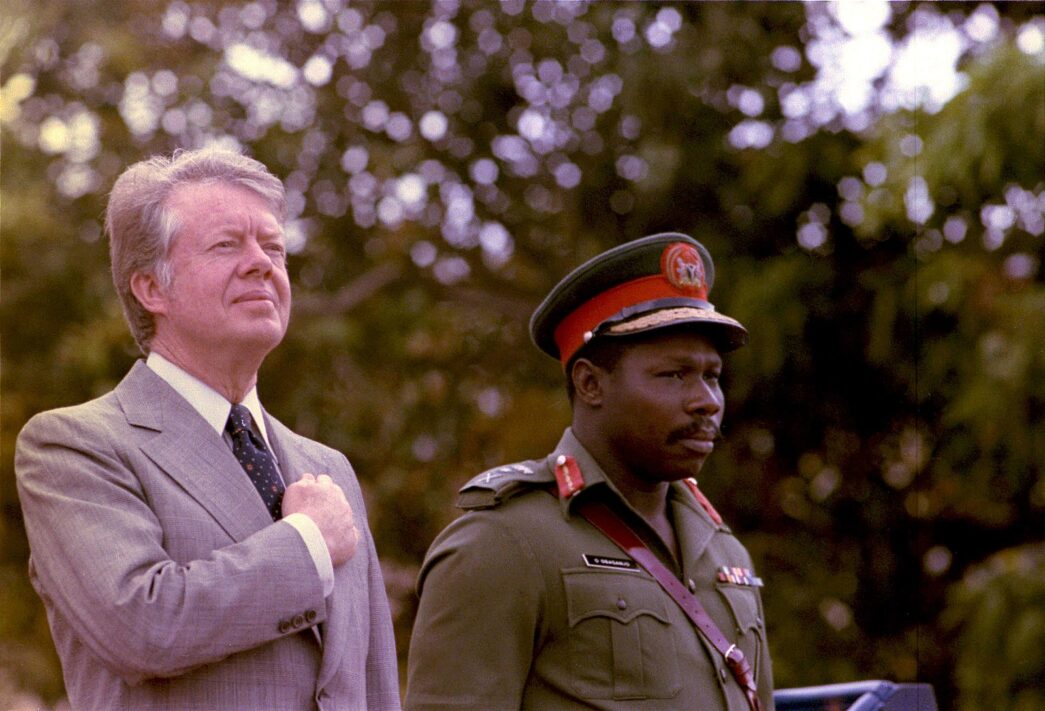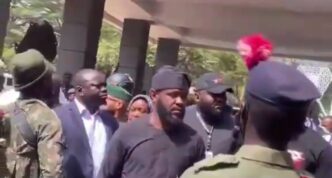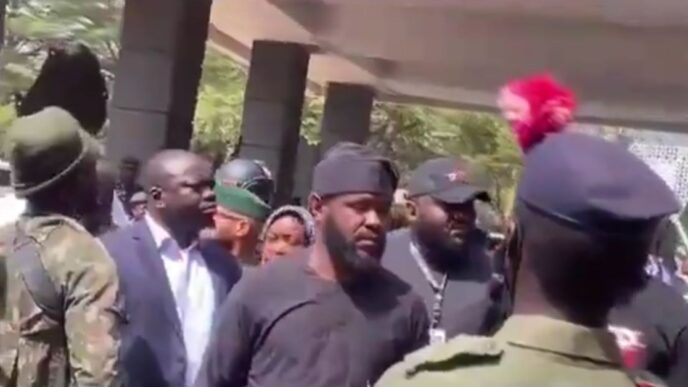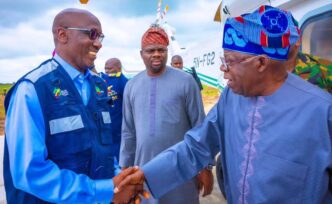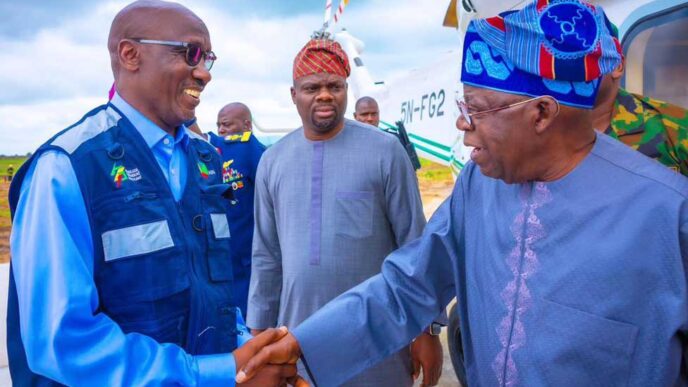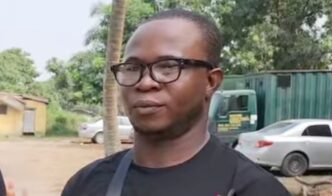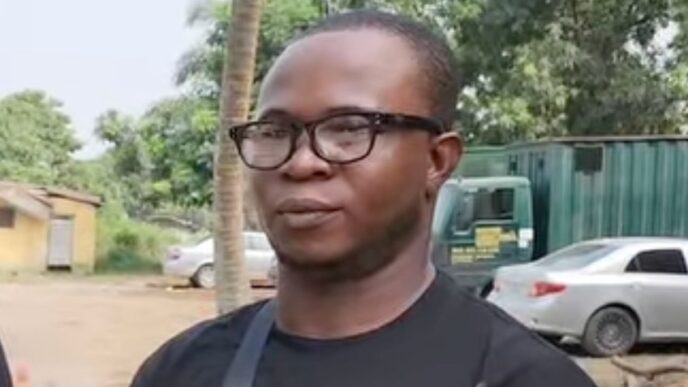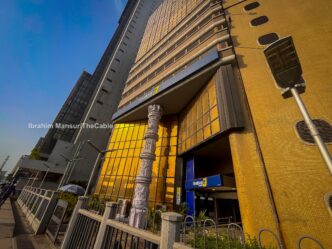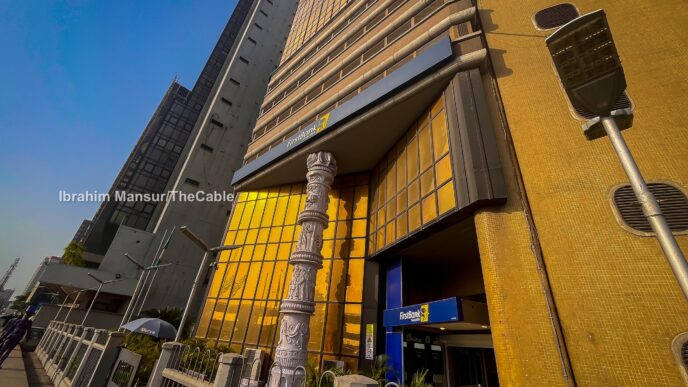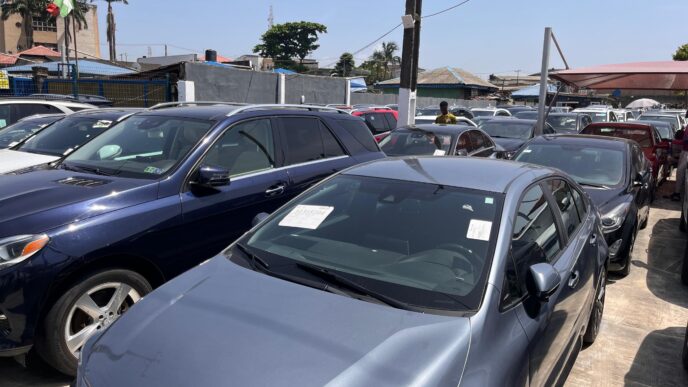Carter, as US president, visited Nigeria in 1978 when Obasanjo was military head of state
Presidents Jimmy Carter and Olusegun Obasanjo had much in common; both were leaders of their countries in the 1970s, both were evangelical Christians of the Baptist denomination, and both were promoters of good governance and democracy.
It was not much of a surprise when they became close-knit friends after they left power — Obasanjo as Nigeria’s military head of state in 1979 and Carter as US president two years later.
But Carter did not allow the friendship to get in the way of his reservations about the 1999 presidential election that brought Obasanjo back to power as a democratically elected president.
Carter led the delegation of the Carter Center and the National Democratic Institute (NDI) to monitor the elections.
Advertisement
Before the final results were announced, Carter told the media: “Some of the local officials apparently permitted exaggerated reports of voter participation and in some cases that we witnessed, there were some ballots in the box that were not cast by voters.”
He said he and other foreign monitors were waiting to assess the extent of rigging. This, he explained, would help them determine if it had a bearing on the outcome and form the basis of their verdict on the election.
When the Independent National Electoral Commission (INEC) announced Obasanjo of the Peoples Democratic Party (PDP) as the winner with 18,738,154 votes, ahead of Olu Falae — candidate of both the Alliance for Democracy (AD) and All People’s Party (APP) — who was credited with 11,110,287 votes, Carter left Nigeria without congratulating his long-time friend and ally.
Advertisement
This was interpreted in many quarters as a silent protest against the conduct of the election.
Falae referred to it while rejecting the election result, saying the conduct was so bad that “even his friend Jimmy Carter” did not congratulate him.
“From what I have heard so far the election has been a farce… I said if General Obasanjo won a free and fair election I would congratulate him but clearly this is not a free and fair election,” Falae said.
He challenged the election in court but eventually withdrew his petition “in the interest of democracy”.
Advertisement
FULL TEXT OF THE MONITORS’ STATEMENT ON THE 1999 ELECTION
The Carter Center and the National Democratic Institute (NDI) offer this statement on the February 27 presidential election in Nigeria, to supplement the preliminary statement of February 28.
- The delegation commends the strong, widespread support of Nigerians for a rapid transition to democratic civilian rule.
- The delegation recognizes the commitment of the Head of State to move forward with a transition program, including the handover of power to civilian authorities on May 29.
- Although there were many positive aspects of the presidential election, notably the peaceful conduct of polling, we are greatly concerned about evidence of serious flaws in the electoral process in certain areas of the country.
- Such problems as we observed in the election process, and any grievances, can best be addressed within the context of democratic procedures and the rule of law.
- We support Nigerian and international efforts to develop democratic institutions and to strengthen political and civic organizations at local, state and federal levels.
The Carter Center/NDI Delegation and its Work
The delegation was led by former US President Jimmy Carter, former Niger President Mahamane Ousmane and retired US General Colin Powell, and included elected officials, political leaders, regional and election experts from 10 countries in Africa, Asia and North America. We were invited to participate as international observers by Head of State General Abdulsalami Abubakar and the Independent National Election Commission (INEC). Throughout the process we received full cooperation and support from the government, INEC, Nigerian political parties and nongovernmental organizations that monitored the electoral process.
Advertisement
For the presidential election, the 66-member delegation visited polling stations and collation centers in 20 states and the Federal Capitol Territory of Abuja. The delegation visited 335 polling stations in 112 wards in 61 Local Government Areas, in all six zones of the federation. Delegates also observed collation processes at 33 Ward, 20 Local Government, and 6 State levels. Our observers coordinated with international and domestic observers in each state and met with a cross section of Nigerian political party leaders, election officials, and representatives of nongovernmental organizations.
The delegation’s mission is intended to assess in an impartial and nonpartisan manner the evolving political environment, to offer a report on the presidential election, and to demonstrate the support of the international community for Nigeria’s developing democratic process. Although the international community may well play an important role in supporting Nigerian democracy, it will ultimately be the people of Nigeria who will determine the legitimacy of the elections and the transition process.
Advertisement
Transition from Military Rule
This election represents the final electoral step in the process of transition from military rule to civilian government. Throughout this process The Carter Center and NDI have been impressed by the determination of Nigerians throughout the federation to realize democratic government. The Nigerian people have expressed their desire for a rapid end to military rule, both through voting and through other forms of popular expression, including the media and public forums. In addition, we are encouraged by the firm commitment of the present military government to adhere to their transition schedule and to achieve a prompt handover to civilian rule on May 29.
Advertisement
Conduct of the Election
We noted many positive elements of the election process, including the peaceful conduct of the balloting and the pre-election campaign, the general lack of intimidation of voters, and the thorough and fair coverage by the Nigerian media. In addition, in many locations the voting process followed INEC procedures. We also wish to commend many INEC officials, party agents, security officers, and local government officials who helped to ensure proper conduct of the elections in these localities. Millions of Nigerian voters also showed patience and commitment in following procedures and taking the time to cast ballots.
Advertisement
Although there were many positive features of the presidential election, members of the delegation also observed a number of serious malpractices in certain places. These included:
Inflated vote returns – At polling sites in at least nine states, particularly in the South-South zone, we observed turnout that was sharply lower than that reported at a statewide level. In general, our observers estimated participation averaging twenty percent at the polling stations we visited. We also observed a distressingly low participation of women voters in many areas. In some places, the reported figures appeared to be so inflated that it was impossible to ascertain who actually won the election in that area.
Ballot Box Stuffing – Several observers witnessed instances of ballot box stuffing, including cases of ballots marked by the same persons’ fingerprint, or neatly stacked in sequential order inside the boxes.
Altered results – In many instances, observers recorded low numbers of accredited voters or few voters at polling stations, sometimes less than 10 percent of those registered. During the counting and/or collation processes, later in the day, however, they found that these same polling stations, or adjacent polling stations, reported considerably higher numbers of voters, sometimes 100 percent. Usually, the voters in these polling stations were entirely for a single party. In several wards, we noted that a few polling units with extremely high returns could determine the outcome for the entire ward. Observers saw apparent instances where inflated tally sheets were substituted for the original sheets at counting centers. At many polling stations where we witnessed irregularities, it appeared that party agents and/or polling officials were involved in malpractice.
Disenfranchisement of voters – Observers noted some wards where voters were denied their opportunity to vote because ballots were delivered at the end of polling and in insufficient numbers.
– Another matter of concern was inconsistent application of INEC procedures. These included: the lack or non-use of indelible ink at many polling stations, failure to ensure ballot secrecy, late poll openings, and a failure to adhere to a separate accreditation process. This was seen in most areas. However, the delegation made a clear distinction between those procedural difficulties that did not appear to have an adverse effect on the conduct of this election, and those malpractices which clearly distorted the poll results in some localities.
Resolving Electoral Disputes
While we witnessed a number of abuses, the delegation has no systematic evidence indicating that these abuses would have affected the overall outcome of the election. Nevertheless these abuses may have substantially compromised the integrity of the process in the areas where they occurred. We would hope that any credible and documented allegations of electoral violations will be investigated by the appropriate authorities.
It is essential that any grievances related to this election be decided according to the rule of law in a transparent manner, and though those procedures that are consistent with democracy.
Recommendations for Developing Democracy
Throughout this transition and beyond, Nigerians must confront a number of challenges in order to consolidate a democratic system of government. In the spirit of international cooperation, The Carter Center and NDI would like to offer the following recommendations for advancing democracy in Nigeria.
The Electoral Process
- Provide adequate civic education for political parties, polling officials, and voters to ensure adherence to basic electoral laws and democratic procedures.
- Strengthen INEC’s role as an effective, arms-length regulatory body that can ensure a fair and legitimate electoral process.
- Promote strict enforcement of Nigeria’s electoral laws and regulations to prevent fraud and to increase confidence in democratic institutions and processes.
Party Development
Political parties should take the opportunity to build stronger links with their constituencies, and elaborate clear positions on key issues of concern to the nation. There must be a move away from the much criticized politics of money, and winner-take-all contests. Ruling and opposition parties alike must work cooperatively to establish common rules of democratic conduct.
Civil Society
Throughout the transition, members of this delegation have been impressed by the conscientious efforts of civic groups to educate voters, monitor elections, mobilize constituencies, and bring important issues into the public arena. The Transition Monitoring Group (TMG), in particular, has formed an effective network of nongovernmental organizations that can continue to serve a vital role in promoting popular political participation. These organizations and others can play a crucial watchdog role in safeguarding the integrity of democracy. In addition, there are many human rights organizations, women’s organizations, democratic advocacy groups, independent journalists, and popular interest groups active in public life. Their efforts should be encouraged by Nigerians and supported by the international community.
Institutions of Democracy
Nigeria’s emerging democracy needs a sound foundation in effective and responsive institutions. The adoption of a broadly accepted constitution, including the protection of minority group rights, will be a critical early step in this process. An emphasis on federalism at all three levels of government is important as well. A reinvigorated judiciary would provide an essential contribution to maintaining the rule of law.
Civilian-Military Relations
Efforts should be made to integrate the military into a democratic society. Civilian leaders should develop the mechanisms and knowledge needed to oversee and manage security affairs.

